#* &. amane. verse. a family whole.
Explore tagged Tumblr posts
Note
Love your Feanor-garden fic so much!!! What a great piece. I am so enjoying it!!! I am not sure if I previously said how much I love your Maglor is eldritch series -- especially for the 'spiders and estel' part, that truly has stuck in my head for so long and I LOVE it. The whole series is SO great, and I really loved getting to see Maglor w/ his family in Aman again as well. Your version if Lindir is just the best, love it so much!!!!
Thank you so much! My eldritch!Maglor verse and Lindir are very special to me, so I’m very glad you like them too! I also have way too much fun throwing Feanor into situations, so it’s great to hear that you like my garden fic as well. Writing Silmarillion fics have been so much fun these past two years and I’m always so honoured to hear that people like my stories. 😊😊😊
2 notes
·
View notes
Text
momkura: amane what do you have there amane: ryou’s knife ! momkura: no !! ryou: oh my god where did she even find my knife
#* &. ooc. crack.#* &. amane. verse. a family whole.#jokes on you guys its hers now#and this is now my fave verse lmfao
4 notes
·
View notes
Note
Fic authors self rec! When you get this, reply with your favorite five fics that you’ve written, then pass on to at least five other writers (◠‿◠✿) (if you feel like it)
just looking at my Tolkien fic:
birds in the hand (gen; Maedhros, Maglor, Amras, Elurin, Elured; 7k)
This is one of those stories you write like you're possessed and then you look back and go, where did that come from? My changeling child!
A friend said 'write Maedhros finding Elured and Elurin in the woods', perhaps expecting sweet fix-it fic, and so I naturally wrote unfix-it fic about what it might actually have meant to find and have the Doriathrin twins while the child Elwing was at Sirion with the Silmaril. If you give the Feanorians leverage for negotiation, what does that do to the story - and to them?
How do you still get the Silmaril to Aman?
woman into bird (gen; Elwing/Earendil, 6k)
I love this a lot. In my head there's a whole sequence of character-study stories for Tolkien's women that I dare not make an actual project or I will feel crushed by the weight of my own commitment, but this is my Elwing story, and all my Elwing feelings about her trauma, and her extreme youth, and her relationship to Sirion, and to Earendil,and to the past, and how she is remembered in the Legendarium.
annunciation (Fingon/Maedhros, Maglor, Caranthir, 6k)
This is easily the worst thing I have written in Tolkien and also the thing I enjoyed writing the most, because (sorry to anyone who respected me) I am Like That.
A good time for me (not for Maedhros).
all my war is done (gen; Gil-galad, Fingon, Finrod, past Fingon/Maedhros, 13k)
I'm so mad at this story for miring me in wip hell in terms of the sequelae (there are at least three or four other stories in scion-verse I am stuck on) but I love what I did here, I think. I love taking a deranged idea and driving it home all the way into the earth. I love Gil-galad's textual instability compared to his linchpin status in the mythology. I love making his very being an existential problem. I also love Finwean daddy issues... too much?
in the family (gen; Celebrian, Celeborn/Galadriel, Celebrimbor, Narvi, 1.5k)
This is a little slip of a story that has nevertheless burrowed so far into my head it is canon behind every Second or Third Age fic I imagine. Life in Eregion was full of joy and fractures, and Celebrian danced over the thin ice of them. She was fond of Celebrimbor and he of her. There was a thing almost like a family there for a time, built on dangerous faultlines of history.
26 notes
·
View notes
Photo

4900 BBY. Nadira Kine and Adin Bast of Vjun.
Nadira was the youngest daughter of Aman Kine and Colette Malreaux. As such, she was well versed in the politics of Vjun and the force teachings of her Sith family. However, Nadira had a bad case of wanderlust and wanted to see the stars. Fortunately for her, Nadira became friends with a Vjun noble, Adin Bast, when the pair were children.
Adin was the heir to House Bast, Vjun nobles renowned for their spacefaring prowess and the exotic goods they always returned with. As a young adult, Adin was already an accomplished pilot and starship captain. But more than anything, he wanted to simply explore space. So, when the opportunity came to go off on a two year long voyage, he jumped at it and invited his childhood friend Nadira to join him.
Together, Adin and Nadira explored up and down the Salin Corridor, visiting worlds, searching for and mapping new hyperspace lanes and gathering goods the whole time. By the time the pair returned to Vjun, they had amassed a sizable fortune in goods and had also fallen in love. They married shortly after their return and together oversaw the construction of what would become Bast Castle, a massive fortress that Nadira personally augmented parts of with sith alchemy. The pair would go on many more voyages together and by the time of their deaths, there were very few that knew the outer rim hyperlanes as well as they did, and perhaps no one that knew all the secret unlisted routes that they had discovered.
Extended Kine Family
Doll Maker
#the kine legacy#oc: nadira kine#oc: adin bast#doll maker#vjun#always liked the thought of hyperspace explorers#out searching for stable hyperlanes in the galaxy#very dangerous but also just so damn cool#they'd have made great naval explorers and map makers if they were without spaceflight
13 notes
·
View notes
Text
Helia Headcanons
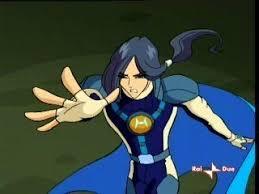
Helia Scofield, nephew of Saladin; Master Artist in the making.
Don’t let his soft demeanor and pacifistic leanings fool you; Helia’s up for the fight if he’s needed.
(All headcanons are mainly for my verses: Left and the New Company of Light. Fair warning.)
-Helia was born to Harley and Hannah Scofield.
-Hannah, Saladin’s twin (and the elder twin, thank you) is an illusion-based witch who works with her Great Uncle’s army. She’s a commander of the Pegasus Unit of the Callistan Army, and unlike her brother, tries to keep herself out of trouble.
-Harley’s more of a gentle soul who enjoys art and runs an art gallery in Callisto.
-As you can imagine, his parents, though loving to him and though they did love each other at one point, have had many disagreements about their lifestyles and what would be best for the family.
-Harley was more pacifistic while Hannah preferred to ‘face things head on’. (Both have great strategic minds though, and… Tended to use them against each other.)
-At a young age, Helia showed potential for magic. Hannah and Saladin tried to help hone his potential skills as a wizard, but the best he could do was simple spells to make himself faster and stronger than normal and to send magic notes. (And a few other minimalistic spells. He couldn’t do anything fancy like his mom and uncle though…)
-It didn’t really bum him out too much though. In fact, it was partially a relief that he wouldn’t have to worry about hurting someone with his magic if his feelings or concentration went out of control. And he had an easy way of keeping his utensils nearby while he was working.
-Helia was in a junior sword fighting league as a kid, something his Uncle Saladin and his mother were very proud of. (Though his father thought it reckless and dangerous and ugly… Even if there was a sort of elegance to sword fighting when done right.)
-He also participated in art clubs at his school and did his to earn high marks in elementary and middle school. (He tended to be a daydreamer and often spaced out in class, especially if the subject was boring to him. Which became another argument for his parents.)
-When he was about 12/13, his parents decided to divorce. Hannah relocated and deployed to serve in Magix at the Callistan Embassy (and to be closer to her brother). His father remained in Callisto.
-He was actually happy that they finally divorced, thrilled to never have to hear one of their ‘we’re not really arguing, just having a heated discussion’ sort of fights. Having to decide where to live and what his plans for the future, however, made him sick.
-His social anxiety was through the roof anyway, and on top of all of this… His art took a bit of a dark turn and so did his poetry.
-How dare his parents fight each other and then demand he choose? How dare they implode on him like this?
-(Faragonda and Griffin were honestly the best people during this time. And so were his childhood friends. They helped him keep his cool and realize what he wanted and how to go about talking to his parents about this stuff.)
-Helia left the sword fighting league, he never really enjoyed it anyway except for the moments he was benched and could sketch the matches. And he decided to stay with his father and enroll at the Callistan Art Academy. His mother was so proud that he wanted to follow his dreams, and agreed to weekends and holidays.
-(Honestly his parents were just happy that he was talking to them again instead of pushing them away. They were so worried, they even went to therapy so they could try and do better for Helia.)
-Helia stayed in touch with some of his sword fighting league friends and kept up with his childhood friends when he went to the Art Academy.
-He loved showing off his new works and talking his friends into being models for some of his works. (One of his favorite portraits is of his best guy friend posing with his new weapon after being accepted into Red Fountain.)
-His parents did move on from each other. On his dad’s side, he has a stepdad and a lovely younger stepsister who adores him. (And he has a half-brother on the way!!)
-His mom remarried a fellow soldier, Monroe. And Monroe has two children of their own; Seneca and Marie. (Older stepsisters… They’re loud and boisterous, but they mean well and Helia enjoys watching them pose and give him fashion shows to help out his own work.)
-Though he was only at the Academy for a short time, Helia discovered many things about himself. (And made friends with the Princess of Linphea who had gotten in despite her age. The fairy is truly gifted in making topiary art.)
-He loves his charcoal brushes and using colored pencils when doing sketches. Something about the way it moves on the paper just makes him so happy.
-And he does love to paint, though he’s not much for water colors. (And never ask him to do a digital piece. The last time he tried working with a tablet, he nearly got electrocuted. Granted, it was probably a one-time thing, but he took it as a sign.)
-Poetry is second love, aside from sketching and painting. He loves being able to verbalize his feelings and put the words down that he can feel inside. Its one of the few ways he feels he can truly connect to people, since it’s easier to write down the words instead of saying them. (Though he has done poetry readings from time to time.)
-Between portraits and landscapes, Helia prefers landscapes. And he’d really gotten into architecture drawings before he left the Academy.
-Because his parents were often busy when he was a kid, he found he had useful skills to ‘adult’ while at the Academy and on his own for the first time. (He can cook fairly well, at least, you know what you’re supposed to be eating and it tastes pretty good. But he’s no Chef Langdon.)
-He was great at keeping his room spotless and clean. His workspaces however? Not so much.
-Over half his wardrobe is stained with either paint or charcoal or clay.
-(Yes, he can do pottery. Just not very well. In fact, it usually looks pretty shit, but hey, he tried.)
-After seeing the news about what happened in Magix and how his uncle’s school was destroyed and the people he cared about nearly died, Helia decided to transfer. (Which took a lot of convincing with his dad and the Dean of the Academy and Saladin.)
-But once he was in, he was in. And when given the choice about his weapon, he went with one his mother loves to use, the laser-string gloves. Great for restraint and for quick weapon-recovery in battle without potentially causing further harm.
-Add in his ability to make himself stronger, and he can wield that glove with the confidence of a sword fighter.
-He quickly clicked with Timmy once he joined their squadron, despite the two having different views of technology.
-Helia was Riven’s roommate though, and while their personalities didn’t compete with each other, they didn’t completely get along either. (Riven reminded Helia of Hannah with his ‘let’s just face it’ ways and Riven felt Helia wasn’t much of a hero if all he did was restrain instead of fight.)
-Of course, as time went on, Helia and Riven do have respect for each other, and have many inside jokes that came from their time living together.
-Helia quickly found he was one of the ‘advisors’ of the group, with everyone coming to him for advice. He was flattered, sure, but dudes… Just because he managed to get what he got, doesn’t mean he knows how he did it.
-Aside from training with his gloves, he’s good using a whip and decent with a sword. Bows and arrows/anything needing aim isn’t his strong suit. He’s also not the best at giving reports on how things went on their missions, which is why that task gets delegated to Sky or Riven.
-He trained as a medic too, deciding that while he wouldn’t be the best in a fight, he can help with the aftermath. And his squad kind of needed a medic aside from Timmy and Brandon…
-Helia may not enjoy fighting, but he’s not above doing what’s necessary when the people he cares about are in danger. There have been plenty of times, not just when saving the Magical Dimension, that Helia has risked his life and limbs to protect his friends.
-One such incident was a survival trip to the Marshlands of Amanal. Brandon never would have made it home in one piece if Helia hadn’t thrown himself at the hippogriff. (And he somehow managed to befriend it afterward. No, he has no memory of how he did it.)
-Helia tends to be a stress-sketcher. Worried about a test? Doodles on his notes from class. Worried about an upcoming mission? Sketchbook in hand. Relationship issues? Sketchbook.
-Oh! He’s a great pilot too! Helia has a great sense of direction and has grown up around the ships, so he knows how to work them. (Now, if you want to know what makes them tick or how to put them together if they fall apart, ask someone else. Preferably Timmy or Riven.)
-Helia has a whole stash of teas. A collection, if you will. (Something that he blames Faragonda for, but hey, it’s not the worst habit ever.)
-After all the traveling he’s done thanks to Red Fountain, Helia sort of understands better why his mom and uncle loved their military days so much. Seeing new places, learning new things, enjoying new foods… It’s quite an existence. (If you can look passed all the fighting and wars and invasions…)
-Yes, Helia does yoga. He also enjoys dance. (And with friends like Layla, Musa, and Nabu, he never has to do it alone.)
-Some of his favorite people to sketch: Flora, for her grace and beauty and the way she seems to just breathe life into natural settings; Sky, for his posture and presence and ability to always appear in charge; Layla, for her strength and grace and how every body of water seems to be at her command; and finally, Timmy and Tecna, As a couple, those two just radiate this feeling of joy and it just… How can you not want to sketch it?!
-(Kiko is also a favorite sketch subject. The little rabbit just has so much personality!)
-This may come as a shock to people, but Helia enjoys horror movies. Preferably the psychological/thriller-based horror movies. It’s the way they capture human emotion and it’s just so poignant and interesting. He wants to learn how to convey such feelings in his work.
-Between his parents, you’d think Helia was closer to his father… In actuality, he’s closer to his mother.
-His mom enjoyed doing things and showing him things and just getting him to be more active and curious as a child.
-His father was more of a watcher. An observer-type. Always looking for something awe-inspiring for his next piece. (Something Helia and Harley bond over now. And laugh at, from time to time.)
-Helia enjoys swapping sketching ideas with Bloom and Stella, looking to see what they’re up to and how they can try and work off of each other.
-(And he has done some physical character sheets and layout ideas for Tecna’s video game idea to help her see her vision more clearly.)
-Helia doesn’t play a lot of video games. They’re just not his thing… But he does have a soft spot for the Sims series after Bloom introduced him to it, and he enjoys this maze creation game that a Solarian gaming company came up with for phones (level 200!!!).
-He swears more than people think he does. It’s almost comical how shocked people are when they meet this ‘sweet and soulful guy’ and then he drops a few ‘f’ bombs while working on his projects. (Not just ‘f’ bombs either… Dude gets creative with his curses. Even Riven’s impressed.)
-Helia didn’t go to Earth with the others, instead taking up a job offer on Callisto to help with remodeling his great uncle’s barracks. (And now, the castle itself… He’s so honored it’s his designs in the works.)
-However, he does visit from time to time. It makes him a little sad though, seeing Earth the way it is. All the pollution creating cars, the strange fashion, the way people seem to disregard each other. It’s so sad.
-When the ‘saving the Magical Dimension’ stuff stops, Helia’s hoping to join with his father’s art gallery and to build on his portfolio of projects. (He knows he already has a few jobs waiting for him, like Stella’s coronation portrait for when she becomes queen.)
-He just hopes his works inspire and touch people the way they do as he works on them.
#winx club#winx club au#winx club headcanons#winx club helia#winx helia headcanons#helia scofield#winx club helia headcanons#helia au#artistic warrior
77 notes
·
View notes
Note
I'm really sorry you had such a rough day at work, I hope you can have a relaxing afternoon/evening/morning (depending on your hours?)
I'd love to hear more about your fic verse and how it differs from the canon timeline. If you want more specific questions I'd be glad to think of some!
Your world building is amazing!
-@outofangband
Thank you!
My ficverse is fairly canon-compliant, with the main fic, Beyond the Darkest Night, taking place for the most part in the Fourth Age, and planned sequels afterwards.
Most of my fics and hcs take place in the same universe as BtDN, however, and a few things that are “canon” to my version that might not be confirmed as canon, but don’t necessarily contradict it (Tolkien’s canon contradicts itself enough anyway) are as follows:
Maedhros ends up in the Void after his death and forswearing the Oath (basically the entire premise for BtDN)
Elrond finds Maglor after the War of the Ring and brings him along to Aman.
The ban on the Ñoldor being lifted includes the dead, so the Finweans in Mandos are able to be reborn after the First Age. Most of them are.
The remnants of Sauron’s spirit are brought to Valinor for judgement by Gandalf.
Amrod dies at Losgar but his spirit lingers with Amras. At times when Amras is in battle, Amrod will appear beside him as a spectre and fight with him (especially during the kinslayings).
Maeglin survives the Fall of Gondolin (barely) due to Sauron’s token, ends up being taken in by the Fëanorians (this is a whole fic in itself that I’m working on). He still lives in Middle-Earth for many ages.
Gil-Galad is Maedhros and Fingon’s child, but was raised for a time by Orodreth in Nargothrond. His elder sister, Erien, was captured while still young and became Thuringwethil, though eventually she escaped Sauron’s influence.
A large portion of the survivors of Sirion are absorbed into Maedhros and Maglor’s people along with Elrond and Elros— this is both good and bad, but they are treated fairly well regardless. On the same note, the twins were treated kindly and they and Maedhros and Maglor grew to consider themselves a family of sorts.
There’s a lot that happens as a result of BtDN as well that I’m not quite going into bc spoilers, but these are just a few things
2 notes
·
View notes
Note
HCs about Elemmírë?
Oh man, for a character we have next to no information about other than “Vanya” and “sang a really sad song about the Trees,” I have a lot of headcanons for Elemmírë!
First of all, Elemmírë is named after a heavenly body (possibly Arda’s version of Mercury?) and the name is not given in either a masculine or feminine form, so we don’t know Elemmírë’s canon gender. This of course means that Elemmírë is trans, you can’t change my mind! I’ve seen depictions of them as nonbinary, which I love, but personally my Elemmírë is a trans woman!
All the rest of my headcanons are pretty much made up whole cloth :)
I intended to make like, a bullet point list of headcanons, but I ended up referencing my recently created personal timeline of the Years of the Trees and the First Age, and...it kind of expanded into an essay on Elemmírë’s role in the larger story of that verse of mine. So, under the cut is a roughly 2,000 word essay on my take on this blank slate of a character!
~
Elemmírë is one of the Unbegotten elves who awoke at Cuiviénen. When she awoke, everyone assumed she was a male elf, which didn’t really sit right with her but she didn’t know how to express herself at the time. For the first part of her life she lived as a nér.
Elemmírë has a sister*, Calima (one of my OCs). Calima marries an Avar, who she manages to drag with her on the Great Journey despite his reluctance to go West. Right before Ulmo takes the Vanyar and the Noldor to Aman, Calima’s husband leaves her and disappears into Taur-im-Duinath...but not before Calima becomes pregnant. Elemmírë comforts her and supports her through the birth of her child, Elenwë - the first child to be born in Aman.
*(My headcanon around Unbegotten siblings is that some elves woke with soul bonds that connected them to other elves, which while they aren’t genetically related, they consider to be siblings of their fëa. This is the case for Elwë, Olwë, and Elmo; I also gave Nowë (Círdan) and Ingwë OC siblings. Finwë is a loner, which is part of why he’s so concerned about creating and keeping a marriage bond...)
While Ingwë is busy building Tirion with Finwë, his sister-in-law Alcariniel (the mother of Indis; her spouse died on the Great Journey and has yet to be reborn) leads some of the Vanyar to the foot of Taniquetil and founds what will become Valmar. Calima, Elenwë, and Elemmírë go with Alcariniel.
At this time, Elemmírë enters into the service of Varda. She develops a close relationship with her Vala, and feels more comfortable in the beautiful starry robes and among the company of mostly priestesses than she ever did in the more gendered Vanyarin society. She sings and composes hymns to Varda and the heavens.
About a century later, Elemmírë is an established and well-renowned musician in Valmar. It is then that she meets Findis, daughter of Indis, when Findis is visiting Taniquetil with her grandmother Alcariniel. Findis greatly admires Elemmírë’s songs and engages her in a discussion about poetry; the two quickly become friends.
After another hundred years or so, Findis’ half-brother Fëanáro has his fourth child. Finwë invites his whole family to the celebration; Findis now lives in Valmar and does not always attend these begetting day parties, but she happens to be in Tirion for the occasion - with Elemmírë, who tags along to the party.
At the celebration, Makalaurë (a young teen in Elf Years) sings a piece he wrote for his new baby brother, and Elemmírë is greatly impressed by his talent and offers to teach him personally. He’s had music tutors before, but none so renowned, and he is absolutely star-struck. Fëanáro has an inherent distrust of the Vanyar, but he cannot deny his son anything, especially when it comes to furthering his craft, so he agrees to let Elemmírë teach Makalaurë, on the condition that she move to Tirion. Findis offers to move back as well, so her friend won’t be alone; they move in together.
A few years later, Elemmírë takes her star student Makalaurë to Valmar so he can perform at her niece’s 200th begetting day party. This is, of course, Elenwë; Makalaurë is immediately besotted with her, and does his best to impress her. Of course, Elenwë is well into adulthood and Makalaurë is still an awkward adolescent, so nothing ever comes of this, but they do eventually become friends.
All this time, everyone has assumed that Elemmírë is a nér, but with every passing year she becomes more and more certain that is not actually the case. At last she confesses to her dear friend Findis that she thinks she might be a nís, and while Findis isn’t quite sure what that means at first, she’s very supportive and encourages Elemmírë to go to Varda with this revelation.
I do operate in a verse where some homophobia and transphobia exist in Aman, kind of accidently put into place by a well-meaning but ultimately harmful decision by Manwë, but Varda is significantly more chill than her husband. She doesn’t really get what Elemmírë is saying, but she supports her servant’s change in expression. Elven gender roles are pretty loose, so it’s not really that much of a difference, and with Varda’s support Elemmírë feels more confident in herself and comes out to the public.
Most elves, especially the Vanyar, likewise don’t really get it, and privately they still see her as a nér, but there is a firm taboo against rudeness which means they will refer to Elemmírë with the correct pronouns and honorifics and such because it would be incredibly rude not to. The discomfort with someone else’s non-normative expression is easier to deal with than the social impropriety of deliberately refusing to respect someone’s wishes about their personal identity.
This, along with Varda’s kind-of-confused-but-she’s-still-got-the-spirit support of Elemmírë means it’s a pretty smooth transition process for her. Since her name isn’t gendered, she decides to keep it, and she is much happier now that she can express her true self. She also has a staunch ally in Findis, who she has recently begun courting.
Again, there is some homophobia in my verse, and two níssi in a relationship is generally frowned upon, but the half-acceptance of Elemmírë’s gender allows them to exploit a loophole in that particular Law/Custom. Manwë, at least, still sees Elemmírë as a nér, and so doesn’t see anything wrong with her dating Findis. It’s not the ideal situation, but Elemmírë and Findis aren’t really the “fight the system” type, so they’re content to live with the happiness they’ve been allowed.
Eventually, Makalaurë reaches his first coming of age** and Elemmírë takes her student on a tour of all Eldamar to show off how exceptional a musician he has become. He is declared a master singer, and leaves Elemmírë’s side to pursue mastery in instruments, beginning with the harp. His teacher couldn’t be more proud.
**(In my headcanon, elves have two coming-of-age ceremonies: one when they reach age 50, and are considered physically mature and old enough to be given more freedoms in their decisions, including now being of a socially acceptable age to start dating; and the other at age 100, where they are considered a Full Adult and able to marry. Sometimes elves marry younger than that, but it isn’t super common. Age pretty much stops mattering, especially when it comes to age gaps in relationships, when an elf is about 150.)
Not long after this, Elemmírë and Findis get married! Makalaurë performs his then-masterpiece at their wedding. Also at the wedding, Findekáno is caught up in all the glorious romance, and the possibilities of same-gender marriage now that two níssi (one a princess!) can be wed, and confesses the depth of his love for Maitimo. Maitimo...immediately panics and brings up all the reasons why their love is doomed, how their aunts are the exception and not the rule and besides there’s that loophole they’re taking advantage of that doesn’t really work for néri like us - but notably does not deny that he feels the same way. Findekáno is heartbroken by the rejection; Maitimo is terrified of his feelings and distances himself from his beloved cousin for a time.
But of course that doesn’t last long - and it’s at the celebration of the birth of Laurefindil, Findis and Elemmírë’s son, that Maitimo brings himself to reconcile with Findekáno...platonically. Of course. Until a few months later where he just can’t take it anymore and breaks down and confesses he can’t deny his feelings any longer, and they get together at long last.
Findis, Elemmírë, and Laurefindil return to Valmar and settle down there. Laurefindil is buds with both his Vanyarin cousin Elenwë and his oodles of Noldorin cousins. At his first coming of age celebration, he introduces his cousin Elenwë (on Elemmírë’s side) to his cousin Turukáno (on Findis’ side), and Turukáno immediately falls madly in love and begins some intense pining that will rival even his older brother’s romantic dramatics.
As strife grows among the Noldor, Findis and Elemmírë distance themselves from Tirion as much as they can; Makalaurë is pretty much the only Finwëan who is allowed to visit them. However, Laurefindil misses his Noldorin cousins and, after his second coming of age, chooses to move to Tirion and join his grandfather Finwë’s court. He becomes even closer to Turukáno (who has by now married Elenwë) and is very loyal to his older cousin.
At the Darkening, Elemmírë is deeply grieved at the destruction of the Two Trees, and it is then that she composes her most famous song, the Aldudénië, “Lament for the Trees.” Her grief is compounded when her son chooses to go into exile with his Noldorin kin - and, almost worse, when her niece Elenwë chooses to leave as well.
Elenwë is the only Vanya who leaves (well, the only Vanya who is fully culturally Vanyarin without any Noldorin ancestry), mostly because she cannot bear to be separated from her husband and young daughter, but also because she knows the story of her Avarin father who stayed behind in Endórë and hopes that she will meet him on the hither shore. (Unfortunately, she perishes crossing the Ice. Idril will eventually meet her maternal grandfather, but not until just before she and Tuor sail West. Elenwë is reborn in Aman shortly after the founding of Gondolin; she reunites with her Vanyarin family and with her good friend Amárië.)
I don’t have a whole lot of headcanons for Elemmírë and Findis during the events of the First Age; they live mostly a quiet life. I think Elemmírë rededicates herself to the service of Varda, and pleads with her Vala to show mercy for the Noldor in their need. (Perhaps that helped to convince Varda’s husband to send an eagle to Thangorodrim?)
When they hear of Laurefindil’s death in the Fall of Gondolin (because of course Glorfindel followed his favorite cousin Turgon to his hidden city, and got a noble house out of it!), Elemmírë and Findis grieve his loss all over again. They don’t know how long it will be before his rebirth, and they soon decide to have another child together. This is their daughter, Faniel, who grows up on stories about her brother’s bravery.
Eventually Glorfindel is reborn, and he has a few good centuries in Aman with his family (and his husband Ecthelion, who he finally gets to marry; they had gotten betrothed the day before Gondolin fell, RIP) before the Valar send him back to Middle-earth to play the hero again. Elemmírë and Findis are once again heartbroken to lose him, but they are at the same time incredibly proud of their son for his bravery and dedication to all things good in the world. This time, he leaves with the blessing of Varda, his mother’s patron Vala, and a promise that he will return when his task is complete. He does, but not until the Fourth Age, when he sails back to Valinor with Elladan and Elrohir!
#silm#silmarillion#headcanons#elemmire#findis#findimmire#trans tolkien#glorfindel#elenwe#oc calima#maglor#varda#ataquenta#tefain nin#my writing#anon#answers#oc alcariniel#comings and goings#stage fright#this got long WOW#also! some background russingon :)
41 notes
·
View notes
Photo

18 | A DISAPPOINTING BOOK | THE POET X | ELIZABETH ACEVEDO
i was really excited for this because i’m a slam & spoken word poet myself, and that’s probably part of the reason it fell short for me. it’s a pretty good contemporary YA novel, and the verse is much stronger than that of most YA novels in verse (i read so much ellen hopkins when i was in middle school). but being better than most YA novels in verse doesn’t... make it good poetry, unfortunately. in general the plainer, emotion-focused school of slam/spoken word poetry just isn’t to my taste, though a good performance can really elevate it, and on the page, there’s just no way to do that. other things i didn’t love: it was very focused around a het romance, which is never something i find fun in a YA book, and the substance of the book felt... thin. a good novel in verse can make you forget that you get a lot fewer words in the whole story than a prose novel, but when i finished the poet x i definitely could not shake the awareness that it was a 30k novella.
the upside: xiomara is a lovely, compelling heroine. i’m really looking forward to reading acevedo’s next outing, with the fire on high, which is in prose and about something that i do also love--cooking--but don’t really consider a big part of my identity, so i won’t be as disappointed if it doesn’t dazzle. the poet x is a good book for non-poets or poetry fans who do really like that plain, straightforward style, but for me, it was personally disappointing that this is going to be The Slam Poetry Book for years, the way rowell’s fangirl was when it came out.
Xiomara Batista feels unheard and unable to hide in her Harlem neighborhood. Ever since her body grew into curves, she has learned to let her fists and her fierceness do the talking.
But Xiomara has plenty she wants to say, and she pours all her frustration and passion onto the pages of a leather notebook, reciting the words to herself like prayers—especially after she catches feelings for a boy in her bio class named Aman, who her family can never know about.
With Mami’s determination to force her daughter to obey the laws of the church, Xiomara understands that her thoughts are best kept to herself. So when she is invited to join her school’s slam poetry club, she doesn’t know how she could ever attend without her mami finding out. But she still can’t stop thinking about performing her poems.
Because in the face of a world that may not want to hear her, Xiomara refuses to be silent.
[ april in books ]
1 note
·
View note
Text
The Killing of Three Thousand Crows Recap EP 1 三千鸦杀
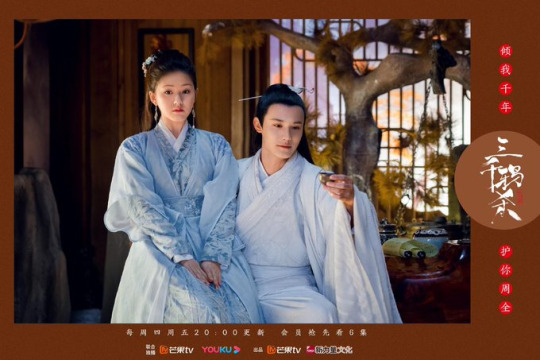
This drama has been a huge blast - I am 8 EPs in and the plot, characters are wonderful and refreshing. The main leads are a hoot themselves, being very hilarious and have their own unique personalities. Props to CGI and costume theme who does their best to make it realistic while in budget, in particularly the costumes feel so natural and pretty.
So just a brief introduction:
This is a Xianxia adaptation from novel of the same name. Xianxia = it involves immortals. Our heroine, Yan Yan, or with her adult/real name Qin Chuan (覃川) is a mortal princess of her country and it has been destroyed by the demon people. Her people are slain and she vowed to kill off each and every demon people to bring peace to her people.
The Male Lead is Jiu Yun (九云), a powerful young immortal who has a crush on her, and he has seen through her ten lives/ previous reincarnation.

We started off with our male lead, Jiu Yun and his friend. His friend ponders why he is sharing with him a drawing by his Shifu/Master and what is it about.

He replied that this was about a war where drums are beating, and bones anre piling up. He also said he didn’t understand the meaning of the drawing for thousand years.
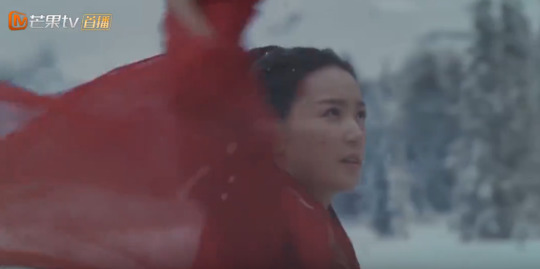
The cinematography is pretty amazing and the narration done by Zhen Ye Cheng (yes our Male lead does his own dubbing along with Zhao Luo Si) is nothing short of haunting. The sequence is written in a semi-classical format, and its a thing of beauty when it combines with great cinematography, great colour combinations, great symbolism (eg drums that reinvigorate a dying party) , great prose and great narration. Look at her red robes flowing in harsh winter while hitting the drums. Maybe I should translate this part later :D

His friend retorted. “It’s normal for mortals to be in war”. He replied "I finally met her yesterday. I have been searching for her for a thousand years” while the screen switch to her facing her enemies alone.
I presume she didn’t survive. Based on some notes on the novel this was her past life. Anyway I really dig these prologues as of late as its normally shot wonderfully and in a simplistic manner + introduce the whole thing.

The scene switched to an enormous paper bird flying down to a city.
I love the design of the paper bird. Its delicate. Can I have one for a Mercedes?

Our heroine slept at class, slacking off from learning paper folding spells which is a secret skill of Dali royalty. He also scold her that she have already learn for a year but she knew nothing.Her Shifu challenges her to make ten paper crane.
She could fight with Bai Qian with tardiness though what Bai Qian did is even more crayy
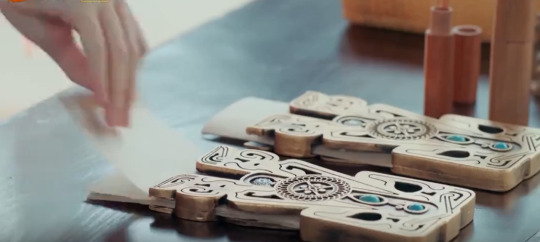
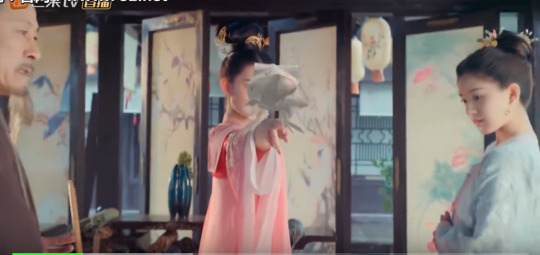
She defended herself that paper folding spells emphasize on making it freely/casually. Under her shifu threat, she back off, saying she can do it anyway, but instead she made a frog.
The sequence is amazing btw. The CGI is really on point here :D
The paper container too is delightfully designed. Along with the sunscreen panels at the background
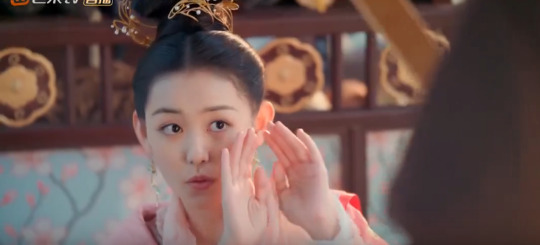
The set design and the headdress. Its amazing. Look at the Peach blossom background :D. And I enjoyed her acting a lot. She displays the right amount of mischievousness here :D

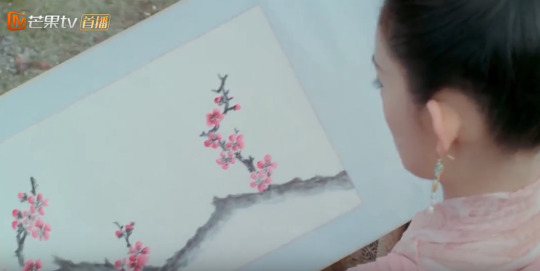
Our princess met with her brother and to cheer her up, her brother shows her a painting he obtained. She said the painting is fine but not worth two to three thousand coins.
Yeap. It looks like regular drawing even from my POV. But I hope whoever drawing this is not offended T_T (based on TMOPB the artist will normally on set whenever their artwork is shown)

He asks her to look at it carefully. Soon the garden turns into winter, and winter plum blossom starts blooming, and sometime later it turns back to normal. She excitedly asks him where he obtains the painting. He told her he obtained it from the famed painter, Gongzi Qi (公子齐).
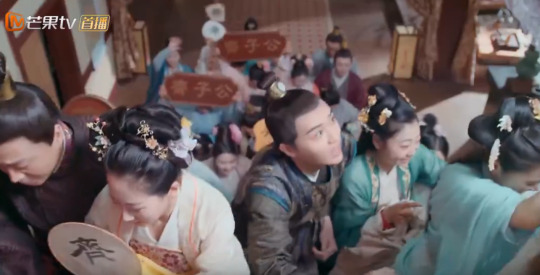
Cue hilarity ensured of Gongzi Qi being synonymous with celebrity, full-on with fans dying to have his artwork and to see him, and her brother the prince being very excited to obtain one. While looking for the artist, a scroll appears on his hand and he looks both happy and confused.
Here’s how he describes Gongzi Qi:
Gongzi Qi, he was rumoured to be extremely handsome, with one of the kind drawing skills. He was rumoured to apply rare immortal spells to his artwork.
She muses that man is too proud. And if Gonzi Qi said his art skills are his second-best skill, then his music skills should be out of the world. Her brother said he wrote a song titled East Wind Peach Blossom Flower .. nope it's half a song not a full song (WTF XD) and he refuses to write the other half, saying that no dancer will be able to dance this song (I see you Gongzi Qi, you are tempting her). Indeed our princess is up to the challenge and asks her brother to request him to finish the song so she can dance to it.
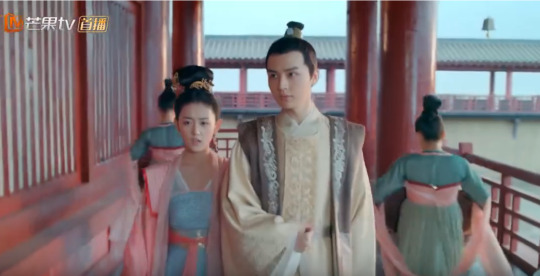
The siblings then visit their cousin, where her brother advises her not to be rude. Apparently their aunt and cousin are attending their mom’s 40th birthday celebration.
After greetings and praises, the two women throwing barbs at each other, we know that Xuan Zhu (玄珠,the cousin) recently start to learn immortal skills under a mysterious teacher. Their barbs become a quarrel, causing their companions to try to rein them in. Yan Yan excuses herself. The quarrel continues as both are tugging a purple handkerchief.

A man came in. Yan Yan seems to be jealous that this guy (Zuo Zi Chen, 左紫辰) seems to come here to visit Xuan Zhu. He clarifies that he is here on behalf of his father to see her cousins. She instantly brightens up and let him go.
OK, first crush? And guy seems to be interested.

At the court, the King seems to be really worried about Tian Yuan, as they have usurped three countries around Dali. He is also worried as his prime minister Zuo (Zi Chen dad) applies for retirement at this time due to health. He announces that he will pay a visit to Prime Minister Zuo.

Our Prime Minister seems quite healthy (healthier than the king!!) and performs some ritual that's clearly demonic.
This is performed in front of a satan like figure. That's demonic even in Taoist book right?

Our prince got the sheet music, but with a bet from Gongzi Qi: She must be able to perform it, else he will make her a laughing stock. While visiting the prime minister, she took the opportunity to visit Zi Chen. She blocks him from visiting the king. Instead, she wants him to ask him something on the new music sheet she obtained since he is extremely good with music.
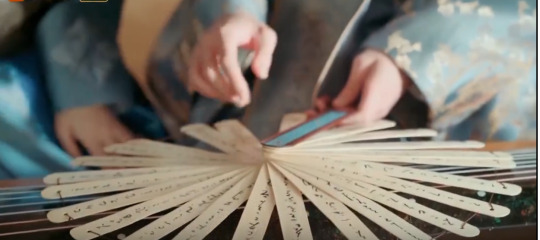
uwuuw the music sheets are so pretty
Zi Chen was amazed since he never saw such complicated tunes. There is a catch though. The verse she pointed out is rather bloody and will cause the audience and the performer to feel very sad, totally inappropriate for a birthday celebration. He answers the way to go is to change the tunes from a sad tone to a happy one.
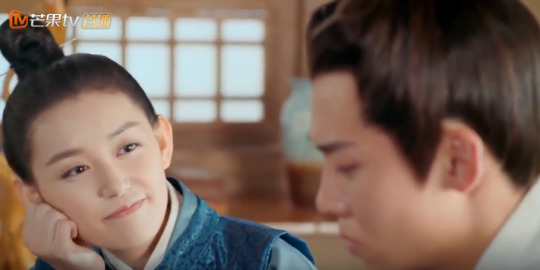
Girl is clearly enamored with him and his skills. He turned around and ask whether his modified tunes sounds right. She thinks it's great. And she gifted him a hairpin, helping him to wear the new hairpin. She finishes pining the hairpin and touches his face. He reciprocates by grabbing her hand tenderly

OMG I must say this scene is so well done. Very tender, and little words need to be said.
After she left, his father looks for him. He looks anything but friendly. He asks whether he knew the reason the king came. Oh gosh, the prince is way too naive. His father is clearly plotting about something. But he is a young man in the midst of meeting his first love, maybe that's why he didn't catch on the shenanigans.
The Princess is totally unaware of the plot tho, she happily shares her joy with her maid, Aman and hoping for the day Zi Chen will marry her. She also declares that she will be able to conquer the tough music sheets and it will prove Zi Chen's musicality is superior to Gongzi Qi.

At night Gongzi Qi visited her, leaving her a note. She wakes up and declared again that she will win their bet. Gongzi Qi hears her in the court garden and leaves with a smile.

It seems like the budget is spent on the prince wardrobe. His gear looks very natural and menacing ha. But the candles deco is totally inferior to TMOPB Ye Hua house. Maybe the Demon People are saving the $ for war?
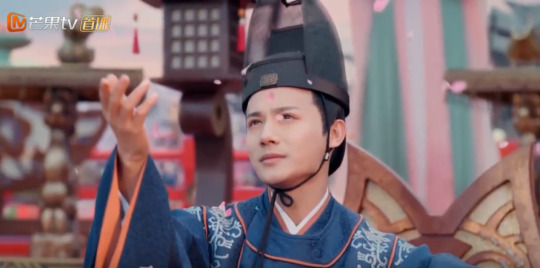
Yan Yan dance is stellar, she interprets the music sheets beautifully, with peach blossoms,snow and leaves. The audience including her brother, Zi Chen, and Gongzi Qi are amazed.
Oh wow the music is wonderful. It reminds me of TMOPB EP30 Peach blossom scene OST - the warm and sweet feel kinda touch. And the dance is shot beautifully. Although I think some of the dance moves are done by a professional dancer? Not a problem imo since one of the most beautiful performances in cdrama history is choreographed by a dancer.
And YESSSS.... his wardrobe is really on point here and the angles the cinematographer take is really good. He is not your conventionally attractive lead so I understand that some angles will not stand out. Kudos to the production team!
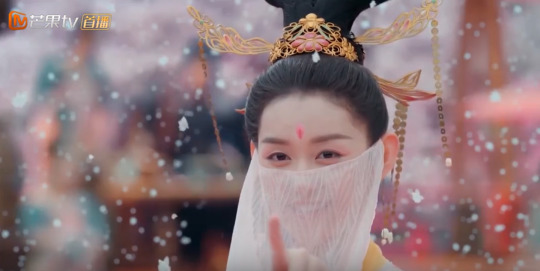
The dance ended and Gongzi Qi was shocked that she changed the ending of his sheet music. HA, SO YOU KNOW SHE IS GONNA PERFORM AT HER MUM’S BIRTHDAY BASH PARTY AND YOU WRITE HER A BLOODY TUNE? lmao he is pissed and serves him right XD. And what's wrong with your bestie XD? He seems to have a tendency to pine after a married woman.
They met Shifu who seems to be their ShiXiong (Elder brother disciple). Shifu reminded Gonzi Qi that since he is an immortal, he shouldn’t involve with mortal matters especially when Yan Yan is still very young. Gongzi Qi asks if he insists on doing it? Shifu replied that her fate has been decided and he shouldn’t go against fate. He seems to accept that decree and he hands over a huge scroll of painting, requesting Shifu to pass it to her.
Note: The reason why Shifu is able to involve is that he owes a debt to the Dali Royal family per the book.
At night the city is being attacked, and Yan Yan wakes up feeling happy and refreshed. She saw the painting scroll, both her and her maid marvelled at the painting and she told her maid that she wants to go outside alone to visit Zi Chan.

Meanwhile, Zi Chan father sent his son away “ For praying in the temple. Do request for glory at Royal Court”. His son wonders as his dad will not need it because he is retiring. His dad replies smoothly that it’s for Zi Chan. Zi Chan wanted to pray for his father’s health, and his father praised him lightly, sending him away. Looks like he is sending him away for safety.
COMMENTS
I have been waiting for this drama for some time, and luckily they are no longer stuck in broadcasting hell. This EP has a lot to unpack, introducing the background and characters. I feel this EP wonderfully introduces multiple characters while making Yan Yan and Zi Chan characters unique. Yan Yan character is sweet while slightly spoiled, she is still very charming herself, and have all the characteristics of a well-loved high born lady. Zi Chan too stands out as the highly ranked son, with his politeness and his crush with Yan Yan being really subtle. Plot-wise it is interesting and hopefully, the revenge plot won’t be too over the top later. The drama is also not afraid to insert some modern jokes (AHEM CELEBRITY ARTIST) while feeling super natural in doing so.
The magic spells they introduce are fairly unique too (paper magic) which can be quite handy. The brief introduction of paper cranes and paper frogs are delightful. The costumes are delightful too. One of the difficulties of cdrama production is making costumes natural relative to the period and making it beautiful. I love Zi Chan wardrobe here because he looks great in it while not making him too prince-like. Likewise I like that Gongzi Qi wardrobe are slightly more fancier than a normal immortal /Taoist disciple (YEAH HIS WEIRDASS WAYS) but not that fancy.
I think one of the downsides for this drama is the set production. Some of the sets like the snow scene are totally beautiful, while at some parts its so obvious the wood is made of plastic, or the garden looks too tropical. That being said I understand cdrama fantasy budgets are tight + high likelihood of delayed broadcasting, so these downsides are relatively minor, plus the cinematography team is killing it, so I think in overall any fan of xianxia should watch it.
22 notes
·
View notes
Text
The Nathras
Making the Most out of Life

Banner art based on and supported by my Patrons ♥
The Nathras are at home by Ivendarea’s north-western shores and islands and one of the more reclusive population groups. Sticking to themselves and feeling a little detached from the events in the south and east of the nation, they are fairly independent, but a warm, creative, and community-oriented people nonetheless. In ancient times the Nathras used to be mostly nomads, but they also had small semi-permanent settlements along the northern shores, one of them developing into the city Westpoint.
Table of Contents:
Culture and History
Cultural Heritage
Language and Dialect
Shared Values
Common Etiquette
Major Organizations
Fashion
Art and Architecture
Ideals
Beauty Ideals
Courtship Ideals
Relationship Ideals
Continue reading below or on World Anvil
[Support the Ivendarea Project on Patreon]
Culture and History Isolated in Ivendareas northwest, yet still at the frontier and open to the world, the Nathras make up one of the more unique Ivendarean population groups. Not really fitting in with their own people, still proud of their Nyr heritage, they make the best of any situation and oppurtunity.
Cultural Heritage In ancient times the Nathras were predominantly fishermen. They were also the first to build ships and attempt to set sail to foreign shores (with mixed results). With the spread of Aman’s Teachings and more and more people becoming part of this new religion, the Nathras felt increasingly threatened in their way of life. While embracing any new knowledge, some of the rules proposed by Aman, such as not eating fish and meats, or hunting and fishing for food and leather, the Nathras struggled to adapt without any new means to sustain themselves in the cold north with infertile earth. Groups such as the Wylaai, who also had to deal with a too harsh environment for farming, received and embraced the support of southern communities to artificially create fertile land. The Nathras though were more hesitant to give up on their established way of life.
Until today there are many Nathras who call themselves devout followers of Aman’s Teachings while still continuing their traditional trade of fishing.
Despite their isolation, the Nathras were accidental ambassadors for their whole nation on two occasions. Both the Aapha of Darthonis and the Kitu from far away Drua Shye landed first on their shores. So while they are a little bit detached from the main portion of their continent, they are rather connected to dealings with the outside world and developed into versed traders.
Trade is actually spoken more commonly in Westpoint, the capital of the region, than any other language including Nyrval. Currently Westpoint also calls Ivendarea’s largest trade harbour its own, and to the outside world the Nathras enjoy a reputation of being the most laid-back and open-minded of the Nyr. Language and Dialect The accent of the Nathras is considered “flat” and a little monotonous combined with speaking rather fast. Since most Nathras speak Trade more commonly than Nyrval, elements of both languages are mixed into the other, creating a rather unique colour, sound, and vocabulary.
Shared Values Living conditions in the north are comparatively harsh, with unpredictable cold and storms, therefore it is important to the Nathras communities to be adaptable and keep a watchful eye. Courage is one of the most-taught virtues, and unselfish devotion is the most important service one could offer for the community.
The Nathras have a very relaxed view on life and death. Death is not the end of all things, and sometimes a noble sacrifice is necessary to prevent greater evils from happening. Life on the other hand is meant for joy. While not scared of hard work, a rather laid-back attitude is common in the northern villages.
The Nathras work to live, not the other way around. Also, not many would openly call themselves religious, but subconsciously many of their social conventions are actually tightly connected to the beliefs of the Aman’a Valeethi, and most do believe in the gods. They just don’t make a big deal out of it and don’t tend to pry into other people’s business. Accepting differences in regards to politics and religion is essential to the Nathras, particularly because as a people of traders they often have to deal with travellers and outsiders.
Similar to the Wylaai the Nathras are also known to be rather hospitable, and they enjoy fun and entertainment. Westpoint, the settlement with the highest percentage of Nathras among its population, is home to an arena where people can measure their strength in public battles for the entertainment ofma crowd and some coin. All on a voluntary basis of course.
Common Etiquette As much as the Nathras enjoy being part of a devoted community, they expect everyone within the community to contribute something, even if it is just a symbolic gesture. If everyone helps together to get unpleasant things done, the faster it is possible to devote oneself to the beautiful things in life again. While they have a rather relaxed relationship with death, it is not well-liked to talk ill of the dead. In fact, remembering them in a positive light is very important and if not in the local temple, at least in the deceased’s home a small space or shrine is dedicated to their memory.
Entertainment and hospitality are so important that it is rude to refuse an invitation or gifts. Furthermore, no food or drink should be wasted, it should be shared, re-purposed, or donated, never thrown away. The same goes for basically everything else, too: before throwing it out, consider if it could be of use for someone else or for a different purpose. And should someone unexpectedly gain riches, it is expected of them to invest into the community, not hoard their money.
Major Organizations Less an organization but still one of the major institutions in Westpoint, the Arena is the city’s centre of entertainment. No matter if as a spectator betting on contestants, or by entering the ring oneself, it is also a popular place to earn extra coin without big commitments.
Fashion The Nathras will wear their clothes until they’re literally falling apart - and then they’ll fix them as best as they can, use parts of different articles of clothing to make a new one, or find a new purpose for them. Nathras fashion is rugged and wayward, unconventional at best and questionable sometimes too. Influences from a variety of cultures and eras can be found in everyday clothing, the motto is: do what you like.
While most prefer practical clothing that doesn’t get in the way and is comfortable, there is not much the Nathras would frown upon in terms of colour and material combinations. Compared to most other groups of Nyr across the nation, the Nathras in particular prefer more fitted clothing and trousers over the flowing robes, wide sleeves, and huge scarves seen more often in central, southern, and western Ivendarea. Remarkably they are also the only group that very commonly wears clothing made of animal materials such as leather or bone. They don’t tend to make these clothes from scratch, but if a rich Assadin merchant throws out a still decent leather coat, it is going to be re-purposed and worn rather than wasted.

A Nathras worker dressed in a colourful mix of clothes from various cultures and second-hand items is wearing body paint and striking piercings. The woollen scarf has seen better days but was decorated with colourful pearls and pebbles found near Westpoint’s shores. The typically Assadin-style riding boots are commonly worn by soldiers and might have been won in the arena. The trousers are a patchwork of different materials, and the warm Aapha coat’s buttons don’t match, but the fur-lining certainly helps against the cold winter winds.
Art & Architecture The Nathras’ architecture is exactly as patchwork as one might think when looking at their clothing. Building materials are rare, everything is reused several times. Stones of crumbling ruins are turned into the foundation of a new family home, the wooden beams of sunken ships are salvaged, cleaned, and thoroughly dried, then used for building furniture. Driftwood is integrated into the buildings as are rocks dug up in fields. Some houses are built directly into the sides of cliffs where possible. There’s no limit to creativity in terms of housing. In Westpoint in particular nautical elements such as rope and even used fishing nets find their way into people’s homes and gardens. An old steering wheel makes an interesting dinner table.
The Nathras are inventive and creative, and they are known to have an eye for design and beauty. Creating jewellery and all sorts of petty wares and haberdashery from whatever they lie their hands on, their markets are a true paradise for everyone looking to spruce up their wardrobe or buy a unique piece of artwork. Known to have patience and a calm hand Nathras also have a reputation of creating particularly intricate and huge mosaics, incorporating them into their buildings and artwork. They find and create beauty in everything.
Ideals
Beauty Ideals Individuality is beauty, as is creativity and devotion to a cause... and all is subjective. Colourful body paint and makeup emphasizing the body’s anatomy - curves, muscles, tendons, and bone structure - are popular. Hair is adorned with little trinkets, natural or glass pearls, worn in braids, decorated or held together with colourful pieces of fabric, or flowing freely. A positive outlook on life, no matter the difficulties, is considered attractive.
Courtship Ideals Courtship is playful and passionate. Fun and experimenting are important, experiencing small adventures together and getting to know each other during those times. Directness is appreciated, as well as creativity in the way one is wooed, bold and brave is better than following strict traditions and social conventions.
Relationship Ideals It is rather unusual for the Nathras to begin living in a committed relationship in young years. Exploration and adventure are important before settling down, otherwise unrest might cause tension in the relationship later on. On-off-relationships are quite common, where couples cross paths several times before finally deciding to settle down together - if at all. Many actually never settle down, have children with several partners if they want them, and continue to live life relatively independently. It is very common among the Nathras that children are raised by several adults, related to them or not, rather than specific parents. The community is one big family that looks after each other, and its needs stand above individual relationships.
[Read on World Anvil]
[Support the Ivendarea Project on Patreon]
16 notes
·
View notes
Text
Tehhumi’s W.N.I.P.s: Amras/Haldir
I am posting some things over the next little bit that I have stalled out on or not touched in months as Works Not In Progress. (I got the idea from copperbadge’s annual “works no longer in progress”.) These are things that are not quite complete or do not have good formatting, and I may end up coming back to polish someday, but for now they just are as they are. I like the ideas though, s I’m sharing what I’ve got.
This one is Amras/Haldir, from a prompt that was never actually called in Back to Middle Earth Month back in March.
i.
Amras walked in from a visit to Hithlum. “I’m not going back there, send someone else next time.”
Maedhros: ‘Who did you annoy so badly?”
Amras: “Actually, it’s your fault.”
Maedhros: “How is it my fault?”
Amras: “You and Fingon are providing a bad example for the next generation.”
Celegorm had been in the next room. “Oh this, I have to hear. What’s the trend in court? Tormented duets? Tying yourself to buildings? Knifeplay?”
Maedhros: “Must you?”
Celegorm: “You won’t let me go to Hithlum, I have to get all my news second hand. And you can’t help with that,” he nodded to Maedhros’s prosthetic, “So I have to ask Amras.”
Amras: “It’s not a trend, so much as an ideal romantic partner.”
Celegorm: “And no one would give you a second glance if you didn’t tie golden ribbons in your hair. Do you suppose I could pull off the reverse? I think black streaks would look very fetching on me.”
Amras was not going to let Celegorm’s ridiculous comments get in the way of a good complaining session. “The new fascination is redheads who’ve been through a terrible personal tragedy, and only your love can help them recover. Especially if the redhead is a relative who your father disapproves of.”
Maedhros was unable to comment for a minute. “That seems oddly specific.”
Amras: “Maybe people settle for two out of three when I’m not there. As it was, I had to fend off potential suitors every time I wanted a drink.”
Celegorm winked. “That doesn't sound so bad.”
Amras: “Most of them had enough tact not to bring up Amrod in the first sentence, but only most.”
Celegorm: “Sorry.”
Amras: “By the end of the first week I stayed in the palace as much as possible, but unless I wanted to drink in my rooms I still had to deal with them.”
Maedhros: “You could’ve asked for a dinner with just family.”
Amras: “I did, but I couldn’t get narrower than ‘house of Finwe’.”
Maedhros: “And?”
Amras: “Orodreth was visiting from Tol Sirion, and his son idolizes Fingon more than anyone else.”
Celegorm: “What’s his name again - Halon, Halmir, Halfin? Is he even old enough to court?”
Amras: “Haldir is fifty-five, and certain that since Arafinwe married at fifty, he’s old enough to do whatever he likes. He sat next to me at every meal, and kept saying he would be there if I ever need someone to listen.”
Maedhros: “It might help you to talk about it.”
Amras: “Not to a child who never met Father, never saw the Trees, never met Amrod, and is spending the whole time thinking about kissing me!”
Maedhros: “Of course not, but with someone. I find helping other Angband escapees get settled helped me a lot.”
Amras: “Tell you what, I’ll talk with Turgon next time I see him. We can discuss Feanor burning the boats and killing the most important person in our lives, and how we feel guilty because it was our decision to leave Aman in the first place.”
Celegorm: “If you put it like that he’ll punch you.”
Amras: “No he won’t. He was acting the responsible leader of his people last time anyone saw him, that doesn’t allow punching annoying cousins.”
Maedhros: “Last time anyone saw him was forty years ago.”
Amras: “Then I suppose I’ll have to wait a while on the soul-baring emotional discussions. I’m serious about not going to Hithlum though.”
Maedhros: “Alright, I’ll do the visits for the next decade or two.”
Ii. (Haldir so of Halmir)
Amras attended a lot of meetings leading up to the battle Maedhros and Fingon were planning. After all, Amon Ereb is where the best horses were bred, and rebuilding the Noldorin cavalry after the fires of Lothlann was vital. But Maglor was the one who commanded the cavalry, so generally Amras would only be need for an hour or so at a time.
He had been told in very clear terms to leave intra-Noldor diplomacy to Maedhros, he went instead to the area of the city where the Men dwelt. Elves were not a rare sight in Hithlum. After a few days, he found the pub where many of the sons of chieftains, lords of a few dozen soldiers, and other such people spent time. They either had important specialist knowledge, or were there to show their people’s seriousness, but like him were not needed for most of the tactical planning.
Amras sat down next to a dark haired man who, while nowhere near old age, was no longer a youth. “Does this place have good ale, or should I ask for wine first to dull the taste?” Amras asked in Taliska, aware of his accent but figuring it was worth the effort to try and be friendly.
“I find the ale thoroughly satisfactory, but my taste may be less refined than yours.” The man’s speech was, surprisingly, accented as well.
Amras shrugged. “If you say it’s good, I guarantee I’ve had worse. It’s mostly when people spend hours extolling an ale’s praise that I start to worry.” He flagged down the bartender for a pint.
“Literal hours?”
“My brother writes songs, and a friend of his decided to start brewing ale. He wasn’t very good at it, but there were a dozen distinct flavors in every swallow, and my brother sang a dozen verses for each of them. It was mostly to get out of a bet I think, neither admitting the drink tasted like horse piss.”
iii.
Haldir of Lothlorien arrives in Valinor. There’s a party. he meets cute guy. They flirt for a bit, are somewhere semi-private like gardens when they meet. Amras says ‘so hot stuff, what do they call you?’
Haldir: “My name’s Haldir, of Lothlorien.”
Amras: “Seriously?”
Haldir, confused: “yes?”
Amras: “Artanis put you up to this, didn’t she?”
Haldir: “What?”
Amras: “Lady Galadriel of the golden wood or whatever she’s calling herself these days, did she put you up to it? You’d think she’d have better things to do than make fun of me for gossip that’s nearly fifty yeni old.”
Haldir: “First off, Lady Galadriel didn’t put me up to anything. Secondly, I thought you said you were around 2000?”
Amras, awkward: “Ah, sorry. I was counting years-lived rather than years-since-born.”
Haldir: “You spent four thousand years dead? How many times did you get killed that it took so long?”
Amras, defensive: “More like five thousand, but I just died the once. Lord Namo took a while to release me.”
Haldir: What the fuck did you do to get stuck there so long? “Glorfindel says even the traitor of Gondolin was alive before he returned to Middle Earth.”
Amras: “Well, Maeglin was tortured into it after all, and only doomed by descent. I was Doomed in person and specifically, and probably as many dead are on my name as his.”
Haldir: WTF?!
Amras: calm down
Haldir: “So, why did they let you out?”
Amras: “Something about Sauron’s theft of the last corrupted work of my family - I think it was a dwarven ring. The evil end foretold for our good beginnings was now complete, and the Doom fulfilled.”
Haldir: “So now all of you are just free to wander around Valinor?”
Amras shrugs: “More or less. My father’s still not out, and most of the Sindar kings have banned us from their cities. But there’s a lot of Valinor that’s wild, and no one’s stopping us Feanorians there.”
#my wnip's#silm#tehhumi does b2mem#crack pairings 2 card#my fic#amras#as far as i can tell haldir is the only name tolkien used 3 times#beating out even legolas and gelmir
6 notes
·
View notes
Photo
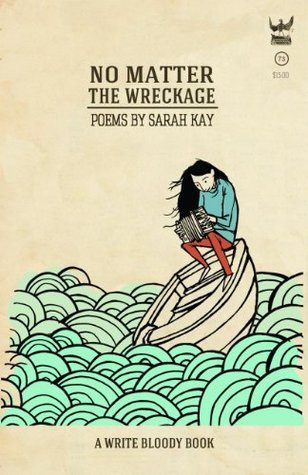

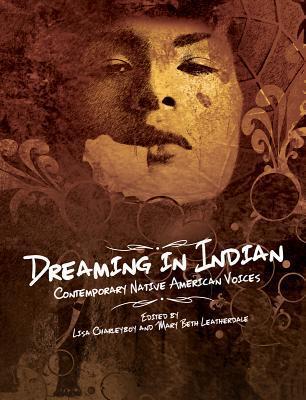



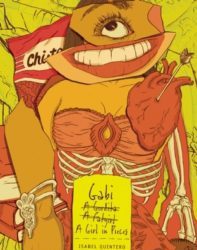
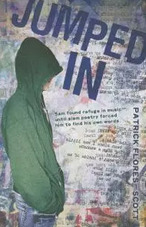
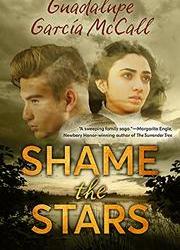

Poetry Favorites
I cannot remember a time when I didn't love words. Poets use words efficiently and effectively and quite often evoke strong emotions, so poetry has also always appealed to me. I tend to seek out anthologies, novels in verse, and even books with poetry sort of sprinkled throughout. Here are a few of my favorites.
Anthologies:
No Matter the Wreckage by Sarah Kay Write Bloody Publishing
Summary: Following the success of her breakout poem, “B,” Sarah Kay releases her debut collection of poetry featuring work from the first decade of her career. No Matter the Wreckage presents readers with new and beloved work that showcases Kay’s knack for celebrating family, love, travel, history, and unlikely love affairs between inanimate objects (“Toothbrush to the Bicycle Tire”), among other curious topics. Both fresh and wise, Kay’s poetry allows readers to join in on her journey of discovering herself and the world around her. It’s an honest and powerful collection.
Voices in the Air by Naomi Shihab Nye Greenwillow Books
Acclaimed and award-winning poet, teacher, and National Book Award finalist Naomi Shihab Nye’s uncommon and unforgettable voice offers readers peace, humor, inspiration, and solace. This volume of almost one hundred original poems is a stunning and engaging tribute to the diverse voices past and present that comfort us, compel us, lead us, and give us hope.
Voices in the Air is a collection of almost one hundred original poems written by the award-winning poet Naomi Shihab Nye in honor of the artists, writers, poets, historical figures, ordinary people, and diverse luminaries from past and present who have inspired her. Full of words of encouragement, solace, and hope, this collection offers a message of peace and empathy.
Voices in the Air celebrates the inspirational people who strengthen and motivate us to create, to open our hearts, and to live rewarding and graceful lives. With short informational bios about the influential figures behind each poem, and a transcendent introduction by the poet, this is a collection to cherish, read again and again, and share with others. Includes an index.
Dreaming in Indian by Lisa Charleyboy & Mary Beth Leatherdale (Not solely poetry, but containing some poetry) Annick Press
A powerful and visually stunning anthology from some of the most groundbreaking Native artists working in North America today.
Truly universal in its themes, “Dreaming In Indian” will shatter commonly held stereotypes and challenge readers to rethink their own place in the world. Divided into four sections, ‘Roots, ‘ ‘Battles, ‘ ‘Medicines, ‘ and ‘Dreamcatchers, ‘ this book offers readers a unique insight into a community often misunderstood and misrepresented by the mainstream media.
Emerging and established Native artists, including acclaimed author Joseph Boyden, renowned visual artist Bunky Echo Hawk, and stand-up comedian Ryan McMahon, contribute thoughtful and heartfelt pieces on their experiences growing up Indigenous, expressing them through such mediums as art, food, the written word, sport, dance, and fashion. Renowned chef Aaron Bear Robe, for example, explains how he introduces restaurant customers to his culture by reinventing traditional dishes. And in a dramatic photo spread, model Ashley Callingbull and photographer Thosh Collins reappropriate the trend of wearing ‘Native’ clothing.
Whether addressing the effects of residential schools, calling out bullies through personal manifestos, or simply citing hopes for the future, “Dreaming In Indian” refuses to shy away from difficult topics. Insightful, thought-provoking, and beautifully honest, this book will to appeal to young adult readers. An innovative and captivating design enhances each contribution and makes for a truly unique reading experience.
See also their other two collections: Urban Tribes & #NotYourPrincess
Novels in Verse
The Poet X by Elizabeth Acevedo HarperTeen [Audrey’s Review]
A young girl in Harlem discovers slam poetry as a way to understand her mother’s religion and her own relationship to the world. Debut novel of renowned slam poet Elizabeth Acevedo.
Xiomara Batista feels unheard and unable to hide in her Harlem neighborhood. Ever since her body grew into curves, she has learned to let her fists and her fierceness do the talking.
But Xiomara has plenty she wants to say, and she pours all her frustration and passion onto the pages of a leather notebook, reciting the words to herself like prayers—especially after she catches feelings for a boy in her bio class named Aman, who her family can never know about. With Mami’s determination to force her daughter to obey the laws of the church, Xiomara understands that her thoughts are best kept to herself.
So when she is invited to join her school’s slam poetry club, she doesn’t know how she could ever attend without her mami finding out, much less speak her words out loud. But still, she can’t stop thinking about performing her poems. Because in the face of a world that may not want to hear her, Xiomara refuses to be silent.
A Time to Dance by Padma Venkatraman Nancy Paulsen Books [My Review]
Summary: Padma Venkatraman’s inspiring story of a young girl’s struggle to regain her passion and find a new peace is told lyrically through verse that captures the beauty and mystery of India and the ancient Bharatanatyam dance form. This is a stunning novel about spiritual awakening, the power of art, and above all, the courage and resilience of the human spirit.
Veda, a classical dance prodigy in India, lives and breathes dance—so when an accident leaves her a below-knee amputee, her dreams are shattered. For a girl who’s grown used to receiving applause for her dance prowess and flexibility, adjusting to a prosthetic leg is painful and humbling. But Veda refuses to let her disability rob her of her dreams, and she starts all over again, taking beginner classes with the youngest dancers. Then Veda meets Govinda, a young man who approaches dance as a spiritual pursuit. As their relationship deepens, Veda reconnects with the world around her, and begins to discover who she is and what dance truly means to her.
Long Way Down by Jason Reynolds Atheneum/Caitlyn Dlouhy Books
Summary: A cannon. A strap. A piece. A biscuit. A burner. A heater. A chopper. A gat. A hammer A tool for RULE
Or, you can call it a gun. That’s what fifteen-year-old Will has shoved in the back waistband of his jeans. See, his brother Shawn was just murdered. And Will knows the rules. No crying. No snitching. Revenge. That’s where Will’s now heading, with that gun shoved in the back waistband of his jeans, the gun that was his brother’s gun. He gets on the elevator, seventh floor, stoked. He knows who he’s after. Or does he? As the elevator stops on the sixth floor, on comes Buck. Buck, Will finds out, is who gave Shawn the gun before Will took the gun. Buck tells Will to check that the gun is even loaded. And that’s when Will sees that one bullet is missing. And the only one who could have fired Shawn’s gun was Shawn. Huh. Will didn’t know that Shawn had ever actually USED his gun. Bigger huh. BUCK IS DEAD. But Buck’s in the elevator? Just as Will’s trying to think this through, the door to the next floor opens. A teenage girl gets on, waves away the smoke from Dead Buck’s cigarette. Will doesn’t know her, but she knew him. Knew. When they were eight. And stray bullets had cut through the playground, and Will had tried to cover her, but she was hit anyway, and so what she wants to know, on that fifth floor elevator stop, is, what if Will, Will with the gun shoved in the back waistband of his jeans, MISSES.
And so it goes, the whole long way down, as the elevator stops on each floor, and at each stop someone connected to his brother gets on to give Will a piece to a bigger story than the one he thinks he knows. A story that might never know an END…if WILL gets off that elevator.
Gabi, a Girl in Pieces by Isabel Quintero Cinco Puntos [My Review]
Summary: Gabi Hernandez chronicles her last year in high school in her diary: college applications, Cindy’s pregnancy, Sebastian’s coming out, the cute boys, her father’s meth habit, and the food she craves. And best of all, the poetry that helps forge her identity.
July 24
My mother named me Gabriella, after my grandmother who, coincidentally, didn’t want to meet me when I was born because my mother was unmarried, and therefore living in sin. My mom has told me the story many, many, MANY, times of how, when she confessed to my grandmother that she was pregnant with me, her mother beat her. BEAT HER! She was twenty-five. That story is the basis of my sexual education and has reiterated why it’s important to wait until you’re married to give it up. So now, every time I go out with a guy, my mom says, “Ojos abiertos, piernas cerradas.” Eyes open, legs closed. That’s as far as the birds and the bees talk has gone. And I don’t mind it. I don’t necessarily agree with that whole wait until you’re married crap, though. I mean, this is America and the 21st century; not Mexico one hundred years ago. But, of course, I can’t tell my mom that because she will think I’m bad. Or worse: trying to be White.
Jumped In by Patrick Flores-Scott Henry Holt and Co. [My Review]
Sam has the rules of slackerhood down: Don’t be late to class. Don’t ever look the teacher in the eye. Develop your blank stare. Since his mom left, he has become an expert in the art of slacking, especially since no one at his new school gets his intense passion for the music of the Pacific Northwest—Nirvana, Hole, Sleater-Kinney. Then his English teacher begins a slam poetry unit and Sam gets paired up with the daunting, scarred, clearly-a-gang-member Luis, who happens to sit next to him in every one of his classes. Slacking is no longer an option—Luis will destroy him. Told in Sam’s raw voice and interspersed with vivid poems, Jumped In by Patrick Flores-Scott is a stunning debut novel about differences, friendship, loss, and the power of words.
Shame the Stars by Guadalupe García McCall Tu Books [My Review] [Interview with Guadalupe García McCall]
Summary: Eighteen-year-old Joaquín del Toro’s future looks bright. With his older brother in the priesthood, he’s set to inherit his family’s Texas ranch. He’s in love with Dulceña—and she’s in love with him. But it’s 1915, and trouble has been brewing along the US-Mexico border. On one side, the Mexican Revolution is taking hold; on the other, Texas Rangers fight Tejano insurgents, and ordinary citizens are caught in the middle.
As tensions grow, Joaquín is torn away from Dulceña, whose father’s critical reporting on the Rangers in the local newspaper has driven a wedge between their families. Joaquín’s own father insists that the Rangers are their friends, and refuses to take sides in the conflict. But when their family ranch becomes a target, Joaquín must decide how he will stand up for what’s right.
Shame the Stars is a rich re-imagining of Romeo and Juliet set in Texas during the explosive years of Mexico’s revolution. Filled with period detail, captivating romance, and political intrigue, it brings Shakespeare’s classic to life in an entirely new way.
Piecing Me Together by Renée Watson Bloomsbury [My Review]
Summary: Jade believes she must get out of her neighborhood if she’s ever going to succeed. Her mother says she has to take every opportunity. She has. She accepted a scholarship to a mostly-white private school and even Saturday morning test prep opportunities. But some opportunities feel more demeaning than helpful. Like an invitation to join Women to Women, a mentorship program for “at-risk” girls. Except really, it’s for black girls. From “bad” neighborhoods.
But Jade doesn’t need support. And just because her mentor is black doesn’t mean she understands Jade. And maybe there are some things Jade could show these successful women about the real world and finding ways to make a real difference.
Friendships, race, privilege, identity—this compelling and thoughtful story explores the issues young women face.
If you want even more great titles, check out our Poetry Month posts from the past.
Poetry Month (2018)
Pieces of Poetry (2017)
Poetry Link Round Up (2016)
Novels in Verse (2014)
Piles of Poetry (2013)
8 notes
·
View notes
Text
@motherofthering. continued !
“Shhh.“ She pets her daughters hair and in a stage whisper. “Don’t fight my love.“ Noting the squirming but the clear as day grin Amane’s trying to hide. She goes in for another attack of kisses, on her nose, on her cheek, on her forehead. Amane is now pelted with kisses of a mother, and totally is covered in her mom’s pale lipstick.

she has a split second before her mother smothers the teen in kisses, captured in a firm grasp and amane squeals and curls in on herself, trying to escape the kisses to no avail. ❝ no fair -- go and kiss one of the boys instead ! don’t be lame ! ❞ they’d probably all ran out of the house -- traitors. she was putting lizards in their beds later on. finally scrabbling free of her mother’s embrace, amane wipes off some of the pale lipstick with the sleeve of her school blazer.
4 notes
·
View notes
Photo

THE BOOK OF ESTHER - From The Douay-Rheims Bible - Latin Vulgate
Chapter 10
INTRODUCTION.
This Book takes its name from queen Esther; whose history is here recorded. The general opinion of almost all commentators on the Holy Scripture, make Mardochai the writer of it: which also may be collected below from C. ix. 20. Ch. --- He and the queen were certainly authors of the letter, (H.) enjoining the celebration of the feast of Purim, or "lots," which is the ground-work (C.) of the present narration. D. --- The compiler has also had recourse to the archives of the kingdom of Persia: so that his work has all the authority that can be required of a profane historian; and being moreover inspired in all its parts, we cannot refuse to receive it with the utmost respect. Those additions which are not now in Hebrew, (C.) though they were perhaps formerly, (W. Origen. D.) have been carefully preserved by S. Jerom, and were recognized by the ancient Vulg. as they are at present by the Greek, without any distinction. Lysimachus, the Greek translator, was probably the author of them. C. xi. 1. C. --- The objections of Capellus against this "Greek scribbler," as he is pleased to style him, despising the judgment of both Jews and Christians, are in general very unaccountably borrowed (H.) from the Latin version, and are easily refuted. Houbigant. --- Those Jews, who have rejected this work entirely, with Melito, (Eus. Hist. iv. 26. S. Greg. Naz. &c.) ought not to prevail against the consent of the majority, (C.) expressed in the Councils of Laodicea, Carthage, Trent, sess. 4, &c. To read this book according to the order of time, we should begin C. xi. v. 2, &c. C. i. ii. and xii. and iii. to v. 14; then we find the distress of the Jews in the rest of that chapter, and in C. xiii. to v. 8, and their delivery in C. iv. to ix. v. 17, and C. xiii. v. 8, &c. and C. xiv. xv. and xvi. The consequences of these events are recorded C. ix. v. 17, &c. to C. xi. 1. (W.) with which verse the book ends, in the Greek editions. H. --- They vary considerably, as did the copies of the ancient Vulgate, which called forth the complaints of S. Jerom, Pref. But the Church has distinguished what was spurious from the genuine word of God; so that the doubts of Lyran, Sixtus, (Bib. viii.) &c. respecting the fragments at the end of the book being not canonical, ought no longer to be indulged; much less can the boldness of many Lutherans, (C.) and particularly of Le Clerc, (Houbigant) be tolerated, who represent the whole work as a mere fiction. The Jews have a greater respect for it than for any of the prophets; whose works, they say, will perish at the coming of the Messias: whereas this will subsist with the books of Moses, and the feast of Purim will never be abolished. C. ix. 28. Maimon. --- Ben. Gorion (ii. 2.) admits the additions. But Josephus is silent about them, as he probably did not find them in his copy. C. --- He recites, however, both the epistles of Assuerus. Ant. xi. 6. D. --- It is not agreed whether these events happened before or after the captivity. But it is now most commonly supposed, that Esther was married to Darius Hystaspes, A. 3489, about the time of the dedication of the temple. C. xiv. 9. He had been on the throne six years, and reigned other thirty. See Herod. vii. 4. C. --- Josephus thinks that Esther was the queen of Artaxerxes Longimanus, who was a great friend of the Jews. D. --- The Thalmud attributes this work to the great Synagogue, consisting of Esdras, Mardochai, Joachim, &c. and, as various persons might write the same history, the Greek, with the additions, seems to be taken from one copy, and the Hebrew from another rather more concise, (Huet. D.) but equally inspired. H.
The additional Notes in this Edition of the New Testament will be marked with the letter A. Such as are taken from various Interpreters and Commentators, will be marked as in the Old Testament. B. Bristow, C. Calmet, Ch. Challoner, D. Du Hamel, E. Estius, J. Jansenius, M. Menochius, Po. Polus, P. Pastorini, T. Tirinus, V. Bible de Vence, W. Worthington, Wi. Witham. — The names of other authors, who may be occasionally consulted, will be given at full length.
Verses are in English and Latin.
HAYDOCK CATHOLIC BIBLE COMMENTARY
This Catholic commentary on the Old Testament, following the Douay-Rheims Bible text, was originally compiled by Catholic priest and biblical scholar Rev. George Leo Haydock (1774-1849). This transcription is based on Haydock's notes as they appear in the 1859 edition of Haydock's Catholic Family Bible and Commentary printed by Edward Dunigan and Brother, New York, New York.
TRANSCRIBER'S NOTES
Changes made to the original text for this transcription include the following:
Greek letters. The original text sometimes includes Greek expressions spelled out in Greek letters. In this transcription, those expressions have been transliterated from Greek letters to English letters, put in italics, and underlined. The following substitution scheme has been used: A for Alpha; B for Beta; G for Gamma; D for Delta; E for Epsilon; Z for Zeta; E for Eta; Th for Theta; I for Iota; K for Kappa; L for Lamda; M for Mu; N for Nu; X for Xi; O for Omicron; P for Pi; R for Rho; S for Sigma; T for Tau; U for Upsilon; Ph for Phi; Ch for Chi; Ps for Psi; O for Omega. For example, where the name, Jesus, is spelled out in the original text in Greek letters, Iota-eta-sigma-omicron-upsilon-sigma, it is transliterated in this transcription as, Iesous. Greek diacritical marks have not been represented in this transcription.
Footnotes. The original text indicates footnotes with special characters, including the astrisk (*) and printers' marks, such as the dagger mark, the double dagger mark, the section mark, the parallels mark, and the paragraph mark. In this transcription all these special characters have been replaced by numbers in square brackets, such as [1], [2], [3], etc.
Accent marks. The original text contains some English letters represented with accent marks. In this transcription, those letters have been rendered in this transcription without their accent marks.
Other special characters.
Solid horizontal lines of various lengths that appear in the original text have been represented as a series of consecutive hyphens of approximately the same length, such as ---.
Ligatures, single characters containing two letters united, in the original text in some Latin expressions have been represented in this transcription as separate letters. The ligature formed by uniting A and E is represented as Ae, that of a and e as ae, that of O and E as Oe, and that of o and e as oe.
Monetary sums in the original text represented with a preceding British pound sterling symbol (a stylized L, transected by a short horizontal line) are represented in this transcription with a following pound symbol, l.
The half symbol (1/2) and three-quarters symbol (3/4) in the original text have been represented in this transcription with their decimal equivalent, (.5) and (.75) respectively.
Unreadable text. Places where the transcriber's copy of the original text is unreadable have been indicated in this transcription by an empty set of square brackets, [].
Chapter 10
Assuerus's greatness. Mardochai's dignity.
[1] And king Assuerus made all the land, and all the islands of the sea tributary.
Rex vero Assuerus omnem terram, et cunctas maris insulas fecit tributarias :
[2] And his strength and his empire, and the dignity and greatness wherewith he exalted Mardochai, are written in the books of the Medes, and of the Persians:
cujus fortitudo et imperium, et dignitas atque sublimitas, qua exaltavit Mardochaeum, scripta sunt in libris Medorum, atque Persarum :
[3] And how Mardochai of the race of the Jews, was next after king Assuerus: and great among the Jews, and acceptable to the people of his brethren, seeking the good of his people, and speaking those things which were for the welfare of his seed.
et quomodo Mardochaeus judaici generis secundus a rege Assuero fuerit : et magnus apud Judaeos, et acceptabilis plebi fratrum suorum, quaerens bona populo suo, et loquens ea, quae ad pacem seminis sui pertinerent.
[4] Then Mardochai said: God hath done these things.
Dixitque Mardochaeus : A Deo facta sunt ista.
[5] I remember a dream that I saw, which signified these same things: and nothing thereof hath failed.
Recordatus sum somnii, quod videram, haec eadem significantis : nec eorum quidquam irritum fuit.
[6] The little fountain which grew into a river, and was turned into a light, and into the sun, and abounded into many waters, is Esther, whom the king married, and made queen.
Parvus fons, qui crevit in fluvium, et in lucem, solemque conversus est, et in aquas plurimas redundavit : Esther est quam rex accepit uxorem, et voluit esse reginam.
[7] But the two dragons are I and Aman.
Duo autem dracones : ego sum, et Aman.
[8] The nations that were assembled are they that endeavoured to destroy the name of the Jews.
Gentes, quae convenerant : hi sunt, qui conati sunt delere nomen Judaeorum.
[9] And my nation is Israel, who cried to the Lord, and the Lord saved his people: and he delivered us from all evils, and hath wrought great signs and wonders among the nations:
Gens autem mea Israel est, quae clamavit ad Dominum, et salvum fecit Dominus populum suum : liberavitque nos ab omnibus malis, et fecit signa magna atque portenta inter gentes :
[10] And he commanded that there should be two lots, one of the people of God, and the other of all the nations.
et duas sortes esse praecepit, unam populi Dei, et alteram cunctarum gentium.
[11] And both lots came to the day appointed already from that time before God to all nations:
Venitque utraque sors in statutum ex illo jam tempore diem coram Deo universis gentibus :
[12] And the Lord remembered his people, and had mercy on his inheritance.
et recordatus est Dominus populi sui, ac misertus est haereditatis suae.
[13] And these days shall be observed in the month of Adar on the fourteenth, and fifteenth day of the same month. with all diligence, and joy of the people gathered into one assembly, throughout all the generations hereafter of the people of Israel.
Et observabuntur dies isti in mense Adar quartadecima, et quintadecima die ejusdem mensis, cum omni studio et gaudio in unum coetum populi congregati, in cunctas deinceps generationes populi Israel.
Commentary:
Ver. 1. Land. He conquered many countries on the continent, and several to which he could not come but by water, which the Jews call islands, whether they were surrounded on all sides by the sea or not. Heb. has not the word all: but as the expressions are indefinite, they are usually taken in this sense. Yet we must not suppose, that the dominion of Assuerus extended over the whole world, no more than that of the Romans, who were styled masters of it. Before this king, the provinces had not paid tribute, but gave what they judged proper. But Darius laid a heavy tribute upon all, that, when half was afterwards remitted, they might esteem it a favour. The Persians hence looked upon him as a trafficker: kaphloV. Herod. iii. 89. and iv. 44. and vi. 7. &c. C. --- Providence punished them for thirsting after the possessions and blood of the Jews. T.
Ver. 3. Seed. Benjamin (Itin.) informs us, that both he and the queen were buried in the chief city of the Medes, which he calls "the great Hamda;" perhaps the province Mardochæa, (or Amordakai. Ptol. v. 20.) near the Persian gulf, may have been called after this statesman. T.
Ver. 4. Then Mardochai, &c. Here S. Jerom advertiseth the reader, that what follows is not in the Hebrew; but is found in the Sept. Greek edition, which the 72 interpreters translated out of the Hebrew, or added by the inspiration of the Holy Ghost. Ch. --- He says, "What is extant in Heb. I have faithfully translated. What follows I found in the Vulg. edition, contained in the Greek language and character: and in the mean time, or waving all dispute for the present, (interim) this little chapter was inserted at the end of the book, which, according to our custom, we have marked with an obel or spit." H. --- These fragments (H.) which the Sept. might have in Heb. or wrote by inspiration, (W.) are not in Chal. or Syr. and the old Latin version, taken from the Greek (C.) of Lysimachus, (C. xi. 1. H.) is inserted by S. Jerom. C. --- Things. He attributes the salvation of the Jews to God alone. H. --- Reflecting on the fall of Aman, (T.) he recollects a dream which he had formerly had. H.
Ver. 5. A dream. This dream was prophetical and extraordinary, otherwise the general rule is, not to observe them. Ch.
Ver. 6. And was. Sept. "and there was light, and the sun and much water." The light enabled him to discern the progress of the little fountain. Yet it was not absurd that the water should appear luminous, like the sun, as it was intended to shew the wonderful exaltation of Esther. H. --- She extinguished a great fire, which threatened ruin. M.
Ver. 10. Lots. Alluding to the Purim of Aman; (C. Capel.) or rather these are only mentioned, v. 13. Houbigant. --- Gr. "He had therefore made two lots...and the two lots came to the hour and time and day of judgment before God, and for all nations." H.
Ver. 11. Time. From all eternity (T.) God had ordained to save his people; and this he declared to his servants, by shewing him two lots. H. --- This became more intelligible after the event, (T.) like other predictions. H.
Ver. 12. Mercy. Gr. "justified." But this often means, shewed mercy. Ex. xxxiv. 7. C. - The book concludes in Greek with the first verse, which we have in the following chapter, though some editions seem (H.) to have had that remark (D.) of the Alexandrian Jews, (C.) at the head of the book. H.
2 notes
·
View notes
Note
impassionedhearts
send me a url on anonymous and i’ll tell you
Do I follow: hell yes | no | now
Rate: Good Bean/10 (translation: 10/10/10/10/10/10)
Comments: Their Amane is a little shit and I love her to death, I would quite literally die for her and want to protect the entire a family whole verse. The way the mun portrays her, Ishizu, Kisara and Anzu is so incredibly unique and distinct, I haven’t talked much to them out of character but all the character interactions I’ve had with Amane (and what I’ve seen with the other muses) is absolutely lovely. They’re very nice and welcoming. I’m glad I follow them, they’re a charmer.
@impassionedhearts
1 note
·
View note
Text
List of best online astrologer in India providing free services
Astrology is more than what we think. Sun signs – Western astrology, Moon sign – Vedic Astrology, even the time of a day all that affects our life’s journey. Find out more on the occult science from the best online astrologer in India.

The stars and planets have continuously impressed us since ages. People look skyward and see the face of the divine there. There is a cosmic dance on the grand scale, and one on the intimate scale, happening for every individual. Pseudoscience is that the study of patterns and relationships — of planets in motion, our birth chart, synastry with others, the make-up of parts — and exploitation that information as a tool to seek out which means.
Free astrology on phone in India offers instant accurate services
Astrology is a well-acclaimed ancient popular science in India which has quite a special place in people's mind. It is the study of the positions as well as movements of the celestial bodies which have influence over the natural world and human affairs. It basically showcases how a life of a person will be by simply mapping the different planet positions at the specific time of her/his birth. It is a pretty large field, and there are some of the most famous astrologers In India, and here is the list of best astrologer in India free who has expertise in Vedic/Indian astrology and western astrology.
Acharya Ravi Yadav
Service Area: Nadi Astrology, Vadic Astrology, Astrology Prediction, Nadi Jyotish, Palm leaf reader
Experience: 15+ years
Qualification: He has done his MA degree in Acharya (Religious Guru) from Sanskrit Institute in Varanasi, India.
Description: Nadi Astrology is an ancient science that sheds light on the journey of your soul and helps you understand your past, present, and future. This mystical science from our ancient seers, not only gives predictions but also suggests remedies to dissolve your karma and course correct your life in the right direction. Acharya Ravi Yadav is one of the best online astrologer in India.
Problems Solved by him: Dosh problem, Business, health, career problems
Language Known: Acharya Ravi Yadav is well versed in Hindi, Telugu, English, and Tamil.
Contact Details: Call on +91 9776190123 or visit Tabij.in
Consultation Type: Direct Call, Online Chat, WhatsApp
Ashraf Ali Molviji
Service Area: Black magic services, black magic removal, vashikaran
Experience: 12+ years
Description: Black Magic is an ancient and potent art. With the help of mystical mantra and spells, black magic can help you to escape from all issue and get out of your difficulties for all time. Best free online astrologer in India Ashraf Ali Molviji can help you with love Marriage problems, husband wife dispute, black magic removal, job problems, health issues etc. with black magic spells. A lot of people are getting his black magic services and satisfied with his expedient work. He has a specific solution for your simple or complex problems.
Problems Solved by him: Intercast love marriage, lost love back, after marriage problems, love problems.
Languages known: English, Hindi, Urdu
Contact details: Call on +91 9776190123 or visit Tabij.in
Consultation Type: Direct Call, Online Chat, WhatsApp
Pandit Aman Chawla
Service area: Vashikaran, Kala jadoo, voodoo spells
Experience: 13 years
Description: Vashikaran is a tantrik process of spells & magic which is very strong for controlling any person, situation and things. Pandit Aman Chawla is the best astrology specialist in vashikaran. He has performed many types vashikaran such as ladki vashikaran, nimbu se vashikaran, naam se vashikaran, long se vashikaran, saas vashikaran, enemy vashikaran mantra, vashikaran on lover, pati ka vashikaran etc. You can consult with Pandit Aman Chawla as he has the best solution related to your all life problems with the help of tantra, mantra, yantra, puja, hawan, powerful vashikaran mantra etc.
Problems Solved by him: Finance, business, family problems, children problems, love and marriage matters
Languages known: English, Hindi, Urdu
Contact details: Call on +91 9776190123 or visit Tabij.in
Consultation Type: Direct Call, Online Chat, WhatsApp
Astrologer Narendra Thambe
Service area: Palmist, psychic, numerologist, tarot reader
Experience: 20+
Qualification: He has done his graduation from Lal Bahadur Shastri National Sanskrit University.
Description: Numerology is one of the branches of Vedic astrology and it studies the situations and problems in the lives of people on the basis of their birth numbers. The fate and luck of a person is studied on the basis of his birth numbers and lucky numbers and accordingly his future is predicted. Best astrologer in India free online, Narendra Thambe makes use of numerology to restore harmony in personal life as well as bring success in career and has transformed the lives of countless people with his knowledge and experience in this field.
Problems Solved by him: The correct time to marry, propose, change job, travel, invest, relocate etc
Languages known: English, Hindi, Marathi
Contact details: Call on +91 9776190123 or visit Tabij.in
Consultation Type: Direct Call, Online Chat, WhatsApp
Astrologer Manjunath Trivedi
Service area: Palmistry, numerology, marriage match making astrologer, vaastu shastra
Experience: 17 years
Qualification: M.A. (Astrology) degree from P.S.Telugu University, Hyderabad
Description: Palmistry is known as Hasta Samudrika Shastra and considered an essential part of Vedic Astrology. If Palm Reading is conducted from a Vedic point of view, an individual can progress his life in a better way. The hands are given the status of a determiner, which helps us in leading our lives. Best jyotish in India, Astrologer Manjunath Trivedi is a Palmist with a fresh approach. He is talented in Numerology and Astrology and has begotten a unique combination reading method.
Problems Solved by him: Health problems, marriage, career problems etc.
Languages known: English, Hindi, Sanskrit
Contact details: Call on +91 9776190123 or visit Tabij.in
Consultation Type: Direct Call, Online Chat, WhatsApp
Keshavji Maharaj
Service area: Kundli matching, Birth chart making, Horoscope Verification, Stone Suggestions
Experience: 30+ years
Qualification: Jyotish post visharada from ICAS
Description: Go beyond your basic Sun sign horoscope and discover the placements of all the planets (Venus, Mars, Jupiter, etc) in your birth chart. Discover your moon sign, rising sign (ascendant) and put the whole picture together. Kundli matching help you find a way to your partner and lead a happy married life. Important aspects such as Gun Milan can be done with kundli milan. Keshavji Maharaj follows Ashtakoot and Dashtakoot matching systems in Vedic Astrology to ensure a happy and healthy married life.
Problems Solved by him: Nadi Dosha, Manglik Dosha, Gana Dosha
Languages known: English, Hindi, Telugu, Tamil
Contact details: Call on +91 9776190123 or visit Tabij.in
Consultation Type: Direct Call, Online Chat, WhatsApp
#astrology#vedic astrology#astrology predictions#Astrology Services#Indian Astrology#astrology websites#vashikaran#black magic#kundli
0 notes